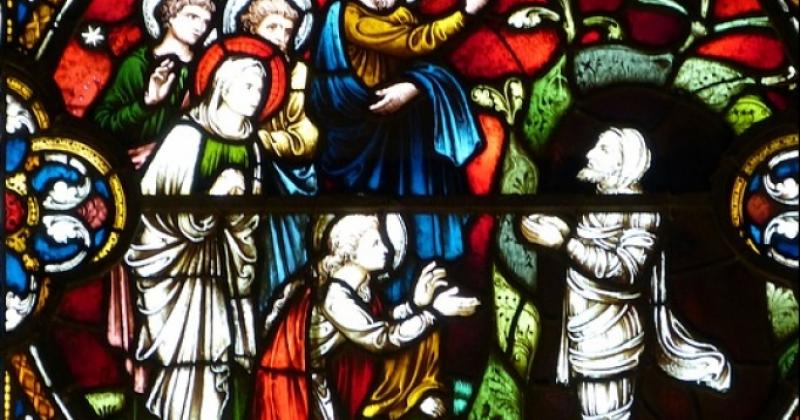This is the third and final “Scrutiny” that the Church proposes for catechumens and candidates.
In the first “Scrutiny”— focusing on the Woman at the Well — Jesus tells us of his thirst for mankind. When we respond in faith, we quench the thirst of Jesus. It’s amazing to ponder that God thirsts for us!
In the second “Scrutiny” — focusing on the Man Born Blind — Jesus wants to give us vision through the eyes of faith. The miracle of the man’s sight returning points to the deeper reality of Jesus correcting our own “vision problem,” which will only be fully corrected when we see our God face-to-face.
The third and final “Scrutiny” focuses on the raising of Lazarus from the dead. This is the greatest of all the miracles of Jesus. The meaning is obvious: Jesus wants to raise each one of us from the dead and give us a share in his divine life.
This “Scrutiny” conveys to catechumens and candidates (and even those who have been Catholic since birth) what the Lord wants to accomplish in our souls through the grace of the sacraments.
Jesus desires to break the chains of sin and death and give us the gift of eternal life.
In the Gospel, two sisters from Bethany, Martha and Mary, send word to Jesus that their brother Lazarus is ill. When Jesus receives word of the illness of Lazarus, he says, “This illness is not to end in death, but is for the glory of God, that the Son of God may be glorified through it.”
Remember what happened with the blind man: “His disciples asked him, [Jesus], ‘Rabbi, who sinned? This man or his parents, that he was born blind?’ Jesus answered, ‘Neither he nor his parents sinned; it is so that the works of God might be made visible through him.’”
Jesus knew that Lazarus would die. The raising of his friend from the dead is meant to manifest the glory of God and also point to the future resurrection of the Lord Jesus.
Jesus says to Martha, “I am the Resurrection and the Life; whoever believes in me, even if he dies, will live, and everyone who lives and believes in me will never die.”
It is worth noting that Martha was the one to greet Jesus, while her sister Mary sat at home. A while back, Mary was the one who sat at the feet of the Lord and anointed his feet with perfumed oil while Martha was busy and worried. Martha seems to have pondered the Lord’s gentle rebuke.
The dialogue between Martha and Jesus about the death of Lazarus brings about a profound profession of faith from Martha. It is practically the same profession of faith that came from the lips of Peter: “Yes, Lord. I have come to believe that you are the Christ, the Son of God, the one who is coming into the world.”
Lazarus had been dead and in a tomb for four whole days. Jesus asked for the stone to be rolled away. He addressed his Father: “Father, I thank you for hearing me. I know that you always hear me; but because of the crowd here, I have said this, that they may believe that you sent me.”
Jesus never works alone. He as God the Son is always in union with God the Father and God the Holy Spirit.
He cried out in a loud voice: “Lazarus, come out!”
This passage of the raising of Lazarus from the dead has been looked upon as how the early Church looked upon how we are restored and made new at baptism as well as how we are restored if we have destroyed the free gift of sanctifying grace by committing mortal sin after baptism.
The confessional has been referred to as a tomb, where a dead Lazarus goes in repentant, confessing his sins and willing to make amends, and, by the power and grace of Jesus Christ, shows how we are restored to life by absolution.
Jesus still calls out to each one of us when we go astray: “Lazarus, come out!”
Some of the most beautiful words that I have ever heard as a penitent and have the privilege to utter as a priest of Jesus Christ are the words of absolution. As an early Church Father says, to restore the life of grace in a soul that has fallen into grave sin is a greater achievement than the creation of the world.
As the priest says:
God the Father of mercies, through the death and resurrection of his Son, has reconciled the world to himself and sent the Holy Spirit among us for the forgiveness of sins; through the ministry of the Church, may God give you pardon and peace, and I absolve you from your sins in the Name of the Father and of the Son and of the Holy Spirit. Amen.
